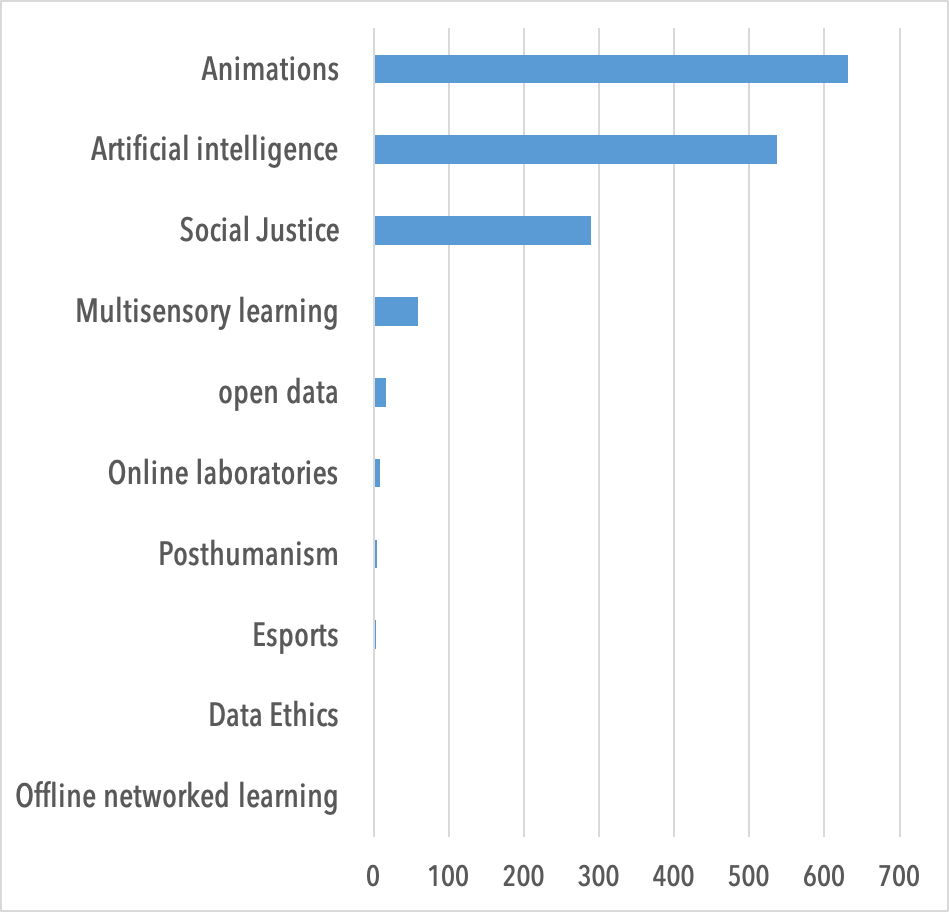Insights From Innovating Pedagogy Report 2020: Data Literacy, Data Ethics and Evidence-Based Action

With the new publication schedule introduced last year, the month of January marks the release of the annual Innovating Pedagogy report. The Open University published the 2020 edition in collaboration with researchers from the National Institute for Digital Learning at Dublin City University, including Gráinne Conole.
The report proposes ten innovations that are already in currency but have not had a profound influence on education in their current form. Each trend is rated based on its impact (high or medium) and placed on a timeline for adoption (ongoing, medium, long). Overall, the report covers a prediction timeframe of five to ten years.
Trends in Depth
As an ed tech specialist, reading through the report is a nice way to start the new year and reflect upon which tools and topics are relevant in my work. This time, I was extremely curious which trends would be deemed crucial at the outset of a new decade.
- Artificial intelligence in education: Defined as ‘computer systems that interact with people and with the world in ways that imitate human capabilities and behaviors’, AI is characterized as having ongoing influence in form of automated assessment, intelligent tutoring, and conversational agents.
- Posthumanist perspectives: As a philosophy, posthumanism examines what it means to be human and whether being human extends beyond our bodies into the real and digital world. As a pedagogy, it opens possibilities to learn with animals and machines as partners.
- Learning through open data: National, state and local governments, as well as regional and international organizations are sharing the data that they create and use in their work with the public. This creates opportunities for authentic assessment and service learning: ‘It is often data that is used in professional work that has a real impact on our lives and the world around us’.
- Engaging with data ethics: There are the many ethical issues surrounding big data, including privacy, ownership and interpretation. The report points to engaging with open data and participating in MOOCs as learning opportunities for students.
- Social justice pedagogy: Last year’s report pointed readers towards ‘Decolonizing Learning’ as ‘a pedagogy that could produce radical changes, leading to learning that not only supports and develops communities but is also strongly rooted within them’. This theme was continued in the current report with a focus on social justice. Education can help people address their unconscious biases as well as the injustices in their own lives and in society. Social justice pedagogy aims to educate and enable students to become active citizens who understand social inequalities and can contribute to making society more democratic and egalitarian.
- ESports: Defined as a form of web-based, competitive video gaming, esports are characterized as a global leisure activity with opportunities to motivate learners, based on the success of platforms such as Twitch. However, concerns arise due to the lack of real physical activity or development of core physical skills.
- Learning from Animations: Showing learners short animated movies of a dynamic process can reveal aspects that are otherwise inaccessible. Animations can model expert problem solving or depict abstractions from the real world, such as growth over time. They are useful in stimulating interest and promoting engagement.
- Multisensory learning: Engaging all senses, including touch, taste and smell is described as multisensory learning, which can enhance communication, engagement, memorization and understanding.
- Offline networked learning: Low cost, low power network hubs like Raspberry Pis can enable localized networked learning without connecting to the Internet, an approach that is labeled ‘offline networked learning’ in the report.
- Online laboratories: An online laboratory is an interactive environment for creating and conducting simulated science experiments. The lab could be accessed through the web or as a program running on a computer, either in the classroom or at home. The aim is for a student to experience the procedures of carrying out a science experiment, including the consequences of making mistakes.
Prevalence in the AACE Research Community
How prevalent are the pedagogy trends highlighted in the report in the AACE research community? We checked the 100,000+ records of LearnTechLib – The Learning Technology Library – here are the results:

# of Records in LearnTechLib
Whereas Artificial Intelligence, Animations and Social Justice return hundreds of relevant abstracts, the five least popular themes have less than ten results. Open data and multisensory learning are in the medium range.
TIP: You can create a collection on any of the topics that interest you most in LearnTechLib and export the bibliographic references as well as full texts to a bibliographic reference manager such as Zotero. Read our article for more information: EdTech Research: Finding, Organizing and Citing Research – Bibliographic Formats & Tools
Conclusion
Last year’s edition of Innovating Pedagogy was by far my favorite, as it highlighted themes such as playful learning and learning through wondrous encounters that are central to my writing, research and design work. The 2020 report seemed to have a stronger focus on technology, starting with the posthumanist perspective and artificial intelligence angle, covering esports, network technology, animations, and online laboratories. Personally, the trend that stood out to me this year was ‘open data’, in particular the thoughtful reflection of its connection to data literacy, ethics and evidence-based action. Additionally, I welcomed the continuous focus on social justice and the considerate analysis of data ethics.
As in previous years, we will follow up with write-ups on selected trends by the AACE Review bloggers.
What are your thoughts? Please add your comments social media using the hashtag #IP2020report.
